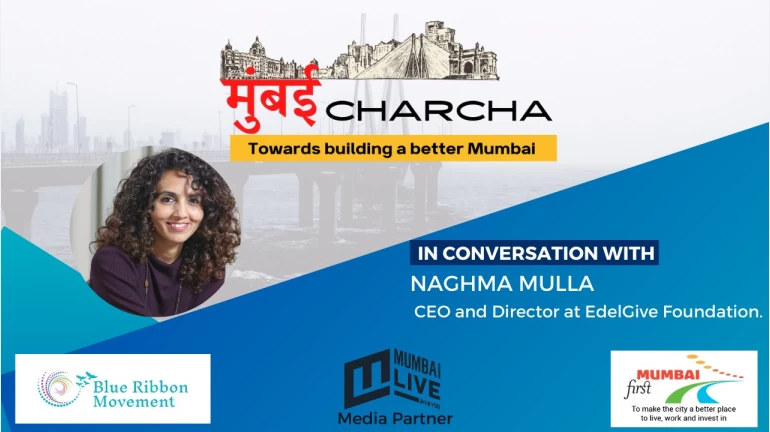
In yet another riveting conversation on Mumbai Charcha, Nagma Mulla, CEO and Director at EdelGive Foundation who has worked across an array of platforms, shares her expertise on philanthropy.
Apart from her foray into asset management as a Chartered Accountant, in the social service sphere, she dwelled in education, migration, women and climate change.
On being asked about her relationship with Mumbai she elaborates on how she is the third generation to be born in the city. Living in a joint family, in the bustling neighbourhood of Byculla, she has had the privilege of an ethnic and multicultural experience.
Mulla shares her two cents on the spirit of Mumbai by uttering, “Post a catastrophe, Mumbai is hailed as resilient, but this is misplaced because it is a burden that the city carries.” She adds, “People make Mumbai. Since they are focused on getting a better life, they miss the little things.”
“Mumbai is fast, it’s furious and it never sleeps. Thus, resilience is part of the deal. Mumbaikars are always on a mission and the city is very driven. However, our biggest weakness is that we don’t pause,” voices Mulla.
Further, into the discussion, she opines that enough is never “enough” because there is no fixed definition. In the social sector context, she mentions that issues are perpetuated over centuries, therefore more people are needed for coordination. Despite this, she claims that one cannot erase any problem in its entirety.
She enunciates, “System changes when enough of us come together to try to move the system.” On the subject of moving systems, Mulla puts on the table certain priority issues for Mumbai. According to her, these entail high density with almost 52 per cent of the city population residing in slums.
She adds to the list, inadequate housing, low wages and poor quality of water. Further to the list of woes is the absence of active citizenship because people are busy going after their mandates, Mulla mentions.
Mulla says, “Concern for civil society should be more in people”. The conversation then shifts gears to corporates and their engagement in active citizenship. She remarks, “In other countries, it pays to be philanthropic because the system makes it easy to give. However, here, it isn’t prescribed formally but people give it informally.”
The CEO voices, “Mumbai homes give to poor families, but it is not enough. India gives more towards religious activities, but looking at improvement for infrastructure amongst others, more should be done.”
This she pronounces be balanced with reasonable corporate expectations for societal benefit. She notes, “Hold businesses accountable for their primary roles, but social responsibility should be there in their DNA,”
Taking the observation ahead she comments, “Corporate engagement should give information, make employees feel good together and have a lasting impression.” She vocalises, “The problem with Mumbai is that people are stuck in limited geography but are isolated at the same time. Thus, the experience of living in different areas of Mumbai is different.”
Broaching the Mumbai subject ahead, Mulla asserts that the present Mumbai beautification project is important. Therefore, she articulates that while the government is doing this, the society should also get actively involved because the state and civil society together make the city.
“The society has to hold the government accountable and that’s where Mumbaikars fail.”
She goes on to insist that while Mumbai is becoming homogenous, everybody’s experience of it is different. “People need to step out of their home to think about society,” she urges.
The talk then wavers towards the Brihanmumbai Municipal Corporation (BMC) elections and its low voter turnout. Exasperatedly she hypothesis, “People need to realise that the most power we have is at the local level because we can hold the corporator accountable. The postponement of the BMC elections is a cause of concern.”
Later, Mulla shares her visions for Mumbai that entail a smooth public transport system as well as better housing.
She concludes, “Mumbai is a land of opportunities if you have access to opportunities. In the city, you need to know which door to knock on.”
Also Read: Mumbai Is The Birthplace Of IT Evolution: Industry Expert





